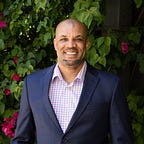Taking a Break from Racial Law
Going on vacation is always an exciting time. Getting away from the hustle and bustle of work and life commitments to relax, unwind, and have fun is something most of us can relate to. This year I went to Orlando, FL to visit my favorite destination spot — Disney World. I enjoy the fact that we can enter into a land where everyone is happy (or seems to be) and quite honestly, where adults can be kids again. My vacation was unforgettable because I got to escape my everyday reality and experiences by reliving the childlike innocence of my youth. I experienced relief because I didn’t have to code-switch. I didn’t feel I was being stereotyped. I didn’t feel prejudices. I didn’t feel discrimination. I didn’t feel biases. Overall, I felt an emotional relief that I haven’t experienced in a very long time. Surprisingly, I not only experience this freedom at Disney World, I also experienced it within the city of Orlando.
One of the most challenging situations for a person of color is navigating through a country that doesn’t place a positive value on them. As Feagin (2013) documents, “As early as 1624, colonial court cases were making it clear that people of African ancestry were framed as socially inferior and physically distinctive in a negative way” (p. 46). As we fast forward to today, most of us are aware that racial inequalities still permeate every institutional and social structures. Pei (2018) argues that anything related to race can be viewed through three distinctives of the minority experience: pain, power and the past. Pain are the emotional realities of what it’s like to be a person of color, power relates to systemic and systematic inequalities whereby the majority has yielded control over, and the past looks at how history has impacted our minorities’ worldview (p. 7). As I have had a lifetime of experience navigating through these inequalities on a daily basis, I felt it very refreshing that for ten days, I was able to experience what it feels like to live in an inclusive environment. The childlike wonder of the most magical place on earth and the diversity of the city of Orlando freed me, for a short time, of the pain, power struggles, and the past I experience on a daily basis back home.
Upon my return to Phoenix, AZ, I had a chance to reflect on my experiences in Orlando. The differences in the cultures of each city, at least for me, is night and day. In Orlando, we visited shopping centers, malls, restaurants, and other establishments. We interacted with people from every corner of the earth and got to hear many stories of people’s personal journey. I saw Orlando as a sort of “sanctuary city” for me. Understandingly so, sanctuary cities are a polarizing topic these days as it refers to places where immigrants are protected by municipal laws. For me however, I found safety in being in a city where the “racial laws” protected me from stereotypes, discrimination, and prejudices. It allowed me to live my life as a human being, regardless of my race, religion, age, gender, etc. I didn’t feel closely watched as I went into stores, I wasn’t being stared at when I went to a fancier restaurant, I didn’t experience microaggressions and tensions because of my race. I didn’t have to code-switch to fit in. Code-switching is often referred to as the ability for a speaker to alternate between two or more languages in a conversation. In my context, code switching is the ability to alter one’s behavior or actions to act like those around me with the goal of fitting in. Why is this so important? I have often said that it is extremely stressful to live a double life, one at home (the real me) and one in public (the assimilative me).
As I remember this experience and the feelings I had, I am more empowered now than ever before to do my part in seeking to dismantle systemic and systematic structures that prohibit all people from realizing their dreams and full potential. Leaders of today and tomorrow need to build cultural competencies to lead organizations where diversity matters, and people can show up as themselves. As you go about your day today, think about what role you can play in making your organization more inclusive. You could very well be the change agent your organization needs?
References:
Feagin, J. R. (2013). The white racial frame centuries of racial framing and counter-framing.
New York: Routledge.
Pei, A. (2018). The minority experience: Navigating emotional and organizational realities.
Downers Grove, IL: IVP Books, an imprint of InterVarsity Press.
